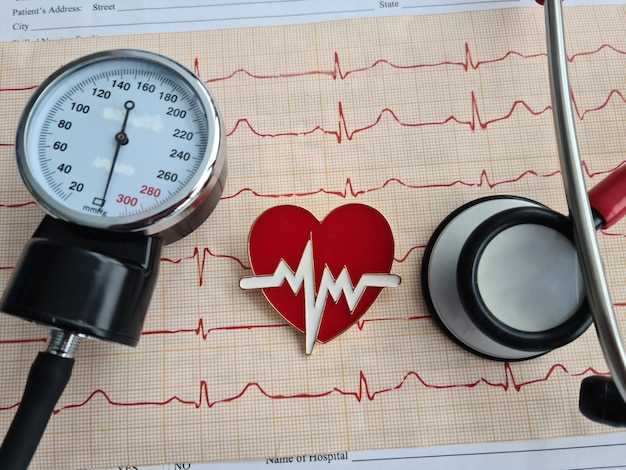
If you’re experiencing a rapid heartbeat while taking losartan, you may be wondering if this medication can cause an increased heart rate. While losartan is generally well-tolerated, some individuals may experience certain side effects, including changes in heart rate. It’s essential to discuss any concerns with your healthcare provider to determine the best course of action. Make sure to monitor your symptoms and report any unusual changes to your doctor.
Understanding the Link

Losartan and increased heart rate may be connected due to the medication’s impact on blood vessels and the cardiovascular system. Losartan is commonly prescribed to treat high blood pressure by blocking angiotensin receptors, which can cause blood vessels to dilate and lower blood pressure. However, some individuals may experience a side effect of increased heart rate or palpitations while taking losartan.
It is essential to recognize the relationship between losartan and heart rate changes to ensure proper monitoring of cardiovascular health. Understanding how losartan affects heart rate can help individuals and healthcare providers make informed decisions regarding medication use and managing potential side effects.
Exploring the Connection
Losartan is a commonly prescribed medication for managing high blood pressure and other cardiovascular conditions. Researchers have been investigating the potential link between losartan and changes in heart rate. Studies suggest that losartan may affect the heart rate by influencing the function of the heart muscles and the blood vessels.
When taking losartan, it is important to monitor your heart rate regularly to detect any changes. It is also essential to inform your healthcare provider if you experience any unusual symptoms such as palpitations, dizziness, or shortness of breath, as these could indicate an abnormal heart rate.
Understanding the connection between losartan and heart rate changes can help healthcare professionals tailor treatment plans to ensure optimal cardiac health. By exploring this relationship, researchers aim to improve the management of cardiovascular conditions and enhance patient outcomes.
Effects on Cardiac Health
Understanding the effects of losartan on cardiac health is crucial for individuals taking this medication. Losartan, a common medication prescribed for high blood pressure and heart conditions, works by relaxing blood vessels, reducing blood pressure, and improving blood flow. While generally well-tolerated, losartan can affect cardiac health in several ways.
1. Impact on Heart Rate
One potential effect of losartan on cardiac health is its impact on heart rate. Some individuals may experience changes in heart rate while taking this medication. It is essential to monitor your heart rate regularly and consult your healthcare provider if you notice any significant changes.
2. Cardiac Function

Losartan can also influence cardiac function by reducing the strain on the heart and improving its overall efficiency. By lowering blood pressure and increasing blood flow, this medication can help support heart health and reduce the risk of cardiovascular complications.
It is important to follow your healthcare provider’s recommendations and attend regular check-ups to monitor your cardiac health while taking losartan.
Risk Factors and Precautions
When taking losartan, it’s important to be aware of potential risk factors and take necessary precautions to ensure your overall cardiac health.
Risk Factors:
- Existing heart conditions
- History of heart rhythm abnormalities
- Age (older adults may be more prone to heart rate changes)
- Use of other medications that can affect heart rate
Precautions to Take:
- Monitor your heart rate regularly
- Follow your healthcare provider’s recommendations closely
- Report any significant changes in heart rate to your doctor
- Avoid sudden changes in physical activity
- Maintain a healthy lifestyle with balanced diet and regular exercise
By being mindful of these risk factors and taking necessary precautions, you can better manage any potential heart rate changes while taking losartan.
Managing Heart Rate Changes
When experiencing increased heart rate while taking losartan, it is essential to consult your healthcare provider immediately. Your doctor may adjust your dosage or recommend alternative medications to regulate your heart rate.
Additionally, maintaining a healthy lifestyle can help manage heart rate changes. Regular exercise, such as aerobic activities or yoga, can promote cardiovascular health and lower heart rate. Avoiding stimulants like caffeine and nicotine can also benefit heart rate regulation.
Monitoring your heart rate regularly and keeping a journal of any fluctuations can provide valuable information for your healthcare provider. By staying informed and proactive about managing heart rate changes, you can prioritize your cardiac health and well-being.
Consulting Medical Professionals
If you experience any unusual changes in your heart rate while taking losartan, it is essential to consult a medical professional promptly. Your healthcare provider can assess your symptoms, review your medical history, and determine the best course of action to address any concerns.
During your consultation, be prepared to discuss any prior heart conditions, medications you are currently taking, and any lifestyle factors that may contribute to heart rate fluctuations. Your doctor may recommend further testing or adjustments to your treatment plan to ensure your cardiac health is optimally managed.
Remember, seeking guidance from a qualified healthcare professional is crucial in addressing any potential issues related to increased heart rate while using losartan. Your doctor can provide personalized advice and support to help you maintain a healthy heart and overall well-being.
